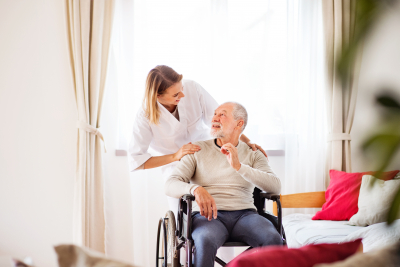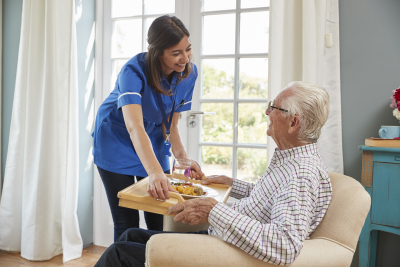How Our Hospice Services Works
Under the direction of a physician, our team of clinicians offers a compassionate, caring atmosphere that surrounds your loved one with the medical, social, emotional, and spiritual aspects of treatment. Our passion for excellence without exception demonstrates our commitment to our patients, their family members, and the community.
Levels of Care
Routine Home Care – This is the most common level of hospice care. Routine home care includes, but is not limited to, nursing and home health aide services. Patients may receive long-term care in their homes or assisted living facilities.
Respite Care – Temporary care provided in a nursing home, hospice inpatient facility, or hospital given to a hospice patient by a caregiver so that a family member or friend who is the patient’s caregiver can rest or take time off.
General Inpatient Care – This level of care is necessary when the patient is unable to be managed at home and hospitalization is required to control distressing symptoms. This level includes all care and services related to the terminal illness.
Our services include:
- 24-hour nursing service
- Wound Care
- Personal care aide
- Medical social services
- Counseling/pastoral care
- Bereavement services
- Physical and occupational therapy
- Dietary counseling and volunteer coordination
- Volunteer Services
- Medications and equipment related to Diagnosis
- Pain Management
- Pet therapy
Your Shalom Hospice team is comprised of compassionate professionals from several disciplines to provide comprehensive hospice care to patients and their families. The team works together to ensure that the patient’s physical, emotional, social, and spiritual needs are met and that the family feels supported. Your full hospice team includes:
Medicare & Hospice Benefits
All patients must meet eligibility requirements for hospice services. The Medicare Hospice Benefit covers Hospice services 100% related to the terminal diagnosis. Patients must choose to elect the hospice benefit and agree to hospice managing all aspects of care related to the terminal diagnosis.
Your Medicare Rights
People with Medicare have certain guaranteed rights. To see a full list of your rights, visit Medicare.gov.
If your hospice program or doctor believes you’re no longer eligible for hospice care because your condition has improved— and you don’t agree—you have the right to ask for a review of your case.
Your hospice provider should give you a notice that explains your right to an expedited (fast) review by an independent reviewer contracted by Medicare, called a Beneficiary and Family-Centered Care Quality Improvement Organization (BFCC-QIO). If you don’t get this notice, ask for it. This notice lists your BFCC-QIO’s contact information and explains your rights. You can also visit Medicare.gov/contacts or call 1-800-MEDICARE (1-800-633-4227) to get the phone number for your BFCC-QIO. TTY users can call 1-877-486-2048.
Note: If you pay out-of-pocket for an item or service your doctor ordered, but your hospice provider refuses to give it to you, you can file an appeal with Medicare. If Medicare denies your claim, you can file an appeal.
For more information on claims, complaints, and appeals, visit Medicare.gov. You can also download our informative brochure.
Get in Touch
We’ll help you find your peace, comfort, and dignity. Contact us today.











